
His name was Dmitry Dyakov, and he was a son of Ukraine.
A chief sergeant in the Ukrainian Army, Dyakov was killed in action on August 14, defending his country against Russian invaders. He was a husband, a father and a grandfather. He was a hero. And, at a time before his peaceful life was upended and he was thrust into war to protect all that he loved, Dyakov was the classmate of Alex Shilman.
Shilman, a senior applications developer at ASI who immigrated to the United States from Ukraine decades ago, was remembering his lost friend this week.
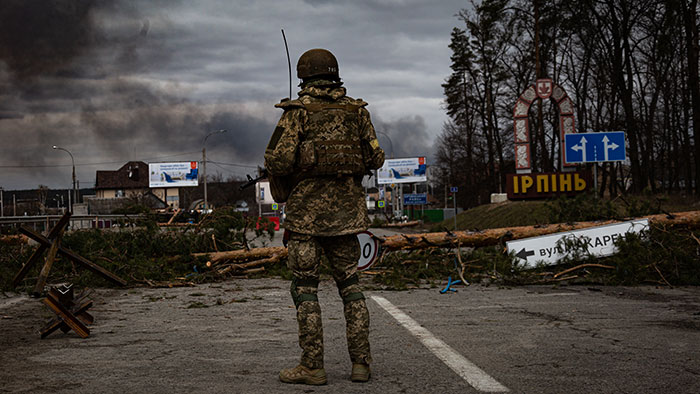
Ukrainian solider stands guard at a checkpoint.
As the grim one-year anniversary of Russia’s most recent invasion of Ukraine neared, Shilman was reflecting with aching sadness but also profound pride on his war-torn home country and the people like Dyakov who have fought, and died, trying to protect it.
“Despite the challenges they have faced and continue to endure, they still stand strong and defend their country against an enemy that endlessly sends rockets on beautiful cities and towns,” says Shilman.
For this ASI Diversity and Inclusion Council article, we spoke with ASI employees and other promo products industry professionals with connections to Ukraine for their perspective on the conflict that continues to send shockwaves around the world – and that shows no signs of stopping.
Feb. 24 marks the day one year ago that Russian troops, acting on the orders of President Vladimir Putin, launched their offensive against their neighbor, igniting a war that has, by some estimates, killed or wounded approximately 280,000 Ukrainians and Russians in action, with some 30,000 civilians having died. Real numbers are hard to come by, though. The war has also instigated Europe’s largest refugee crisis (or “displaced” people, as most prefer to be called) since World War II.
Russia’s offensive is personal for Max Stepanskiy, assistant vice president of enterprise architecture and platform services for ASI. Not long after the war started, Russian forces bombarded his hometown of Bila Tserkva. While Stepanskiy has been in the U.S. for about 25 years now, his aunt and uncle still live in the Ukrainian capital of Kyiv. Rolling blackouts, interruptions to water and heating services, and air raid sirens are common features of their lives. Bombs and rockets exploding in and around cities and towns are a constant threat and often a reality, Stepanskiy shares.
“The destruction of the country’s infrastructure is ongoing, the bombing of the civilian population is ongoing, the crimes against humanity are happening and there’s no visible end to this on the horizon,” says Stepanskiy.
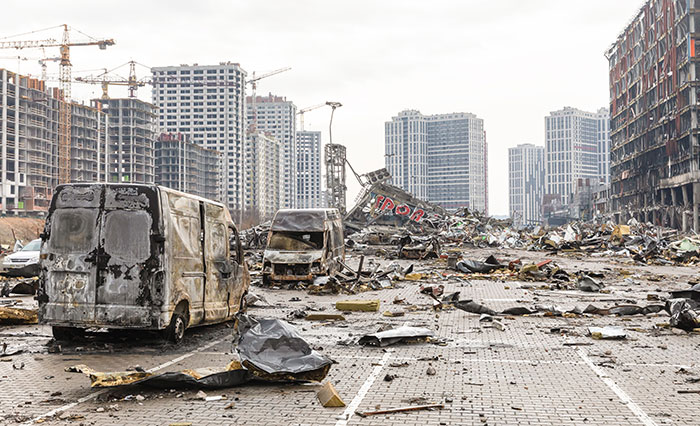
Russian shelling was reportedly responsible for this destruction in Kyiv.
Still, he says, the people of Ukraine have showed a remarkably resolute spirit. They’ve adapted as best they can, keeping faith in their armed forces and clinging to the hope that they’ll make it through to the day when the bloody conflict finally concludes – and they win.
“I feel devastated and sorrowful when I think what people have to deal with,” Stepanskiy says. “At the same time, I’m extremely proud of my fellow Ukrainians; the courage they demonstrate and the struggle they put up against the enemy is absolutely epic. I’m thankful to the countries and their people who have taken the Ukrainian side and have stood with Ukraine in this fight, assisting with humanitarian efforts and military aid.”
Caitlyn Macikanycz, a supplier specialist at ASI, is from the United States but has ancestral and current family ties to Ukraine. The Russian invasion has split up her cousins’ family, displacing some and turning one into a solider.
Mariana, her cousin, fled to Italy with her young daughter. Mariana’s parents sought safety in Poland, where they are lodged with family. Mariana’s brother Sergei remained in Ukraine, where he serves in the Army. Russian shelling destroyed the family home, and friends and neighbors have been killed.
“Sergei is rarely able to get in touch with his family, so they spend a lot of time worried about him,” says Macikanycz. “Mariana says he sees horrible things every day. There’s still shock and surrealism about where they used to live – a neighborhood in Kyiv – being gone.”
While safe in the U.S., knowledge of what her family and Ukraine are enduring weighs heavily on Macikanycz – even more so as the one-year mark of the war hits. “It’s bringing back all the feelings of when the invasion initially happened,” she says.
John Lynch is close to the front lines.
Counselor’s 2022 International Person of the Year, Lynch is the American-born CEO and founder of Krakow, Poland-based Lynka, one of Europe’s leading producers and suppliers of imprinted activewear, corporate clothing and accessories. Lynka, which in 2021 became part of Top 40 supplier Vantage Apparel (asi/93390), is only a couple hours from the Ukrainian border. The firm currently employs approximately 50 to 60 displaced Ukrainians and plans to up that number to nearly 100 in the coming months.
“I specifically say ‘displaced Ukrainians’ because I learned just before our company Christmas party from a few on our team that most Ukrainians living abroad abhor being described as ‘refugees,’” says Lynch. “Not long ago, these folks were teachers, florists, bookkeepers or clerks – and they were tragically forced from their homes, careers, families and lives through no fault of their own. They prefer to be called ‘displaced’ because they can’t wait to return to their homes.”
About 90% of the Ukrainians that Lynka employs are women. Lynch says they are “compartmentalizing their suffering… Their husbands, fathers and brothers are home fighting a war. To stop themselves from worrying to death, they try to keep their minds occupied. Having a job at Lynka is an antidote to anxiety overload.”
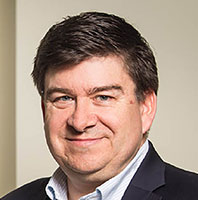
“It will take Ukraine decades to rebuild after the devastation. It’s a sad reality to live with.” John Lynch, Lynka
While it’s a harrowing time for them, those Lynka workers and their fellow Ukrainians staunchly believe that they’ll win the war and eject Putin and the Russians from their country, says Lynch.
“However,” he adds, “they’re resigned to the sad probability that this is going to take a long time and that many more innocent Ukrainians will suffer or die. Furthermore, even when they do win, it will take Ukraine decades to rebuild after the devastation. It’s a sad reality to live with.”
Lynch, like some geopolitical analysts and many in Ukraine, sees the war that erupted on Feb. 24, 2022, as a massive escalation of a conflict that had already begun in 2014 when fighting broke out in Ukraine’s Donbas region between Russia-backed pro-Russian separatists and Ukraine. Lynch brings that up, in part, to share the story of Nataliya, a 15-year-old girl from Donetsk (part of the Donbas) with whom he is familiar.
Poland, once one of the world’s most homogeneous countries, had a deep-seated mistrust of outsiders and a tangled, often painful history with Ukraine. But after Russia’s invasion, it is sheltering more Ukrainian refugees than any other nation.https://t.co/0k3DbjZ3OQ
— The New York Times (@nytimes) February 22, 2023
While the girl and her family remained in Donetsk following the eruption of fighting in 2014, they fled to Poland amid the 2022 invasion. It was a treacherous journey by car, train and foot to Poland, which is sheltering some two million Ukrainians, more than any other country.
When Nataliya started classes in the local school, she was quite shell-shocked at first, says Lynch. Much quieter than a typical teenager, her Polish classmates noticed that every chance she had, she would go outside on breaks and during lunch and just look up at the sky. Her classmates thought that maybe she was praying. As they got to know her better, the Polish kids asked, “Why do you go outside so much and look up at the sky?”
According to Lynch, she replied, “Because I have been living in a dark basement since I was 8 years old because it was too dangerous to go outside. The war was everywhere, every day. I simply forgot what the sky looks like.”
Another Nataliya – Nataliya Royzman, senior financial business system analyst at ASI – immigrated to the U.S. in 1997 from Chernivtsi in southwestern Ukraine. While her mother and sister came with her, many family and friends remain in her native country. It’s tough going for them – and for those who have fled their land for the relative safety of other countries. Royzman has been reflecting on that as the war sparked by the most recent invasion enters its second year.
Shortly after the Feb. 24 invasion of Ukraine last year, ASI employees Nataliya Royzman and Alex Shilman, both originally from Ukraine, appeared on ASI Media’s Promo Insiders podcast to discuss the conflict.
“My best friend’s son woke up on his 13th birthday to news about the Russian invasion, knowing that his childhood had changed forever,” Royzman says. “Now it would be his second birthday where he would have to stay home for the night curfew and most likely his younger three-year-old brother will be crying because there are no lights on. These people live in an area where the war hadn’t touch them directly with bombings, but the economics of living during war times has affected them. I can only imagine how the other kids’ birthdays went this year.”
Royzman shares that her husband’s classmates are patrolling the streets in Kyiv. “A lot of people have reached out personally to either me or my family members asking for personal donations of military grade clothing, gear and shoes,” says Royzman, who feels the impacts stemming from the displacement of Ukrainians – and Russians too that have fled because they don’t want to fight in a war they don’t believe in – can’t be underestimated.
“This human displacement,” she says, “creates a housing crisis.”
In the earlier stages of the war, Shilman’s hometown of Shepetivka, a city in western Ukraine, was not under direct attack. That has since changed, he says.
“Rockets have reached even the smallest of cities,” Shilman shares. “Shelling of residential areas and other critical infrastructure has caused extensive damage and resulted in the loss of innocent lives. This quiet city of 40,000 people is saying goodbye to its local heroes more often that it should.”

“Many teachers have gone above and beyond to support students and provide a sense of normalcy in the midst of the conflict.” Alex Shilman, ASI
Nonetheless, people are doing their best to salvage some semblance of normal life – especially for the children. For example: Another former classmate of Shilman’s is a school principal, whose work has afforded the ASI pro insight into the lives of Ukrainian educators amid the conflict.
“Teachers are experiencing difficulties with providing a stable learning environment but despite all of that, they have demonstrated incredible resilience and commitment to their students,” Shilman says. “Many teachers have gone above and beyond to support students and provide a sense of normalcy in the midst of the conflict. They continue to have extracurricular athletic and art events in order to help the students cope with the trauma of the war and support them in their educational and personal development.”
From the immediate threat on life to economic fallout resulting from the war, Ukrainians certainly have no shortage of worries. But according to Shilman and others, one of the biggest concerns is that western nations, including the United States, will stop supporting the defense effort.
Certainly the topic of how much and what kind of support, as well as how long it should go on, has become an increasingly divisive political topic in the United States and among western nations that have bolstered Ukraine’s cause.
One year later, Kyiv stands. Ukraine stands. Democracy stands. America — and the world — stands with Ukraine.
Рік потому Київ стоїть. Україна стоїть. Демократія стоїть. Америка – і світ – стоїть з Україною. pic.twitter.com/6i02u3aFgd
— President Biden (@POTUS) February 20, 2023
The week of Feb. 20, President Joe Biden visited Ukraine and Poland in a show of his administration’s willingness to keep helping to pillar Ukraine. In the U.S., the move drew both praise and criticism, with some detractors saying the administration’s focus – and spending – should be on pressing domestic issues. In Ukraine, Biden’s visit appears to have resonated.
“Some might say that it is a political stunt and an unnecessary risk when a U.S. or European leader visits Ukraine in the middle of war, but to millions of Ukrainian people, it brings hope and promise that they are not forgotten,” says Shilman. “I’m begging people not to fall for Putin’s rhetoric and to please continue to support Ukraine and Ukrainian people. They are fighting against evil for their survival.”
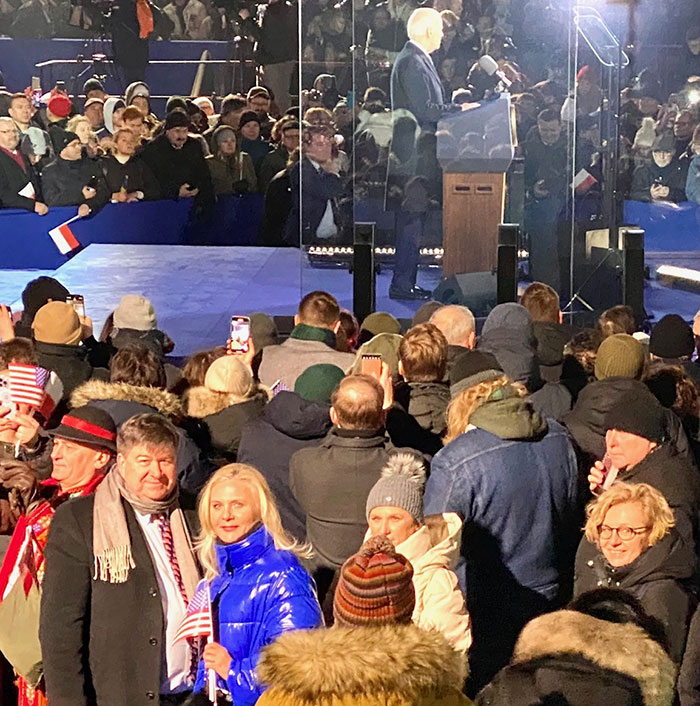
American John Lynch, who lives in Poland and founded an imprinted apparel business there, was in the crowd this week when President Joe Biden visited Warsaw – Poland’s capital – to underscore America’s support of Ukraine and commitment to defending NATO territory.
Living mere hours from Ukraine, Lynch adds a boots-on-the-ground perspective.
“Almost every Ukrainian is certain they will win, but it will take time, maybe even years, and the Ukrainians are wholly dependent on western and American financial and military support,” Lynch asserts. “Strength is the only language Putin understands, and that’s why the solution will come faster if NATO, the European Union and USA provide rapid, substantial support. I know some politicians are using the language of ‘no blank checks’ but that’s just politics. Most Republicans and Democrats alike know how to recognize pure evil; they understand the consequences of letting it grow and spread.”
Says Rick Roth succinctly: “If we don’t help the Ukrainians, we’ll be there fighting ourselves.”
Roth is acting on his beliefs.
He and the business he founded – Mirror Image, a Pawtucket, RI-based apparel decorator – have actively supported Ukraine through merch-driven fundraisers and other means. Roth was inspired to help, in part, because he’s friends with Ukrainian nationals who have had to flee their country due to the invasion – one to England, one to Germany, two to Poland.
“My friends were involved in the Maidan Revolution in 2014,” Roth says. “I was horrified by the 2022 invasion, knowing that my friends would be among the first that would be killed by the Russians. I’m angry too that such naked aggression as the invasion of a peaceful country still occurs. I also have been inspired by the resistance.”
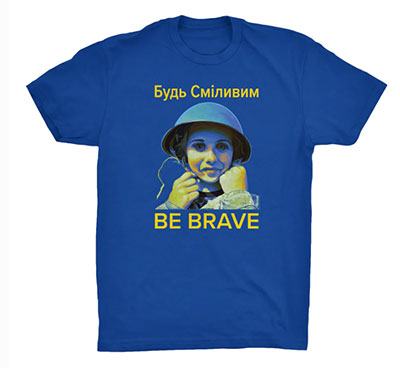
One of the T-shirts Mirror Image is selling to raise funds in support of Ukraine.
Through its Aid for the Ukrainian People collection, Mirror Image sells pro-Ukraine graphic T-shirts; $15 from each sale goes to Vostok-SOS-Ukraine, an organization that’s providing humanitarian aid to the beleaguered nation. “We’re selling the T-shirts and will continue to sell them,” Roth says. “We’ll be adding a poster, some hats and maybe other items too.”
Mirror Image is just one of the many promo products industry companies – large and small – that has flown into action to support Ukraine.
In a spring 2022 initiative led by ASI and the Cohn family, ASI and members of the industry together raised $85,000 to help the Red Cross provide humanitarian aid to Ukraine. “I’m not surprised by our industry’s generosity, but I am very, very grateful to everyone who donated, whether it was $10 or $10,000,” said ASI President/CEO Timothy M. Andrews at the time. “Amid the darkness, good prevails.”
Gemline (asi/56070), a Lawrence, MA-based Top 40 supplier, donated $125,000 to Ukrainian humanitarian relief last year. “We did this through a variety of charities that we either knew or had done research on to make sure that they would be able to efficiently deliver support to those in need,” says Jonathan Isaacson, Gemline executive chair and a member of Counselor’s Power 50 list of promo’s most influential people. “This includes organizations such as Save the Children and Doctors Without Borders.”
Among other endeavors, Gemline also organized webinars to educate industry pros and others about the situation in Ukraine, including one featuring Kyiv Mayor Vitali Klitschko.
To Help: Learn about different charities you can donate to in order to support Ukraine.
In another impressive move, PromoCares, an all-volunteer organization that works to advance social and environmental responsibility in the promotional products market, teamed up with leading industry suppliers to create the #Ukraine4Good campaign.
Another example: 320 Ink (asi/100317), a Maine-based apparel decorator, raised and donated about $9,100 to Save the Children through a T-shirt fundraiser that was themed around the concept of “Maine Supports Ukraine.” A shirt featured a Ukrainian flag bearing a pine tree – the pine tree being a common symbol of Maine.
“We saw a need and wanted to help,” says Drue Nickerson, founder and owner of 320 Ink. “We don’t have any personal connections there, but heard from so many in our community who do. We had the tools and resources to help make a difference and support the innocent children in Ukraine that were being affected by the war.”
Lynka has been extensively involved in relief efforts.
Lynch and employees have driven to the Polish/Ukrainian borders to pick up displaced Ukrainians and transported them to families in Poland where they took shelter. Lynka and parent firm Vantage Apparel paid for the renovations and furniture (beds) at a small housing community in Poland that’s hosting 300 displaced Ukrainians. Lynch founded a tax-deductible charity called Corporate Aid For Ukraine, which has raised more than $1 million for humanitarian support for Ukraine. In addition to hiring and training displaced Ukrainians, Lynka has also offered them Polish lessons.
“As soon as the war ends, Lynka will open an office in Ukraine and take part in the gargantuan reconstruction process of Ukraine,” pledges Lynch. “The citizens will need clothing as will the Ukrainian businesses, and we will be there to help their nation rise from the ashes.”